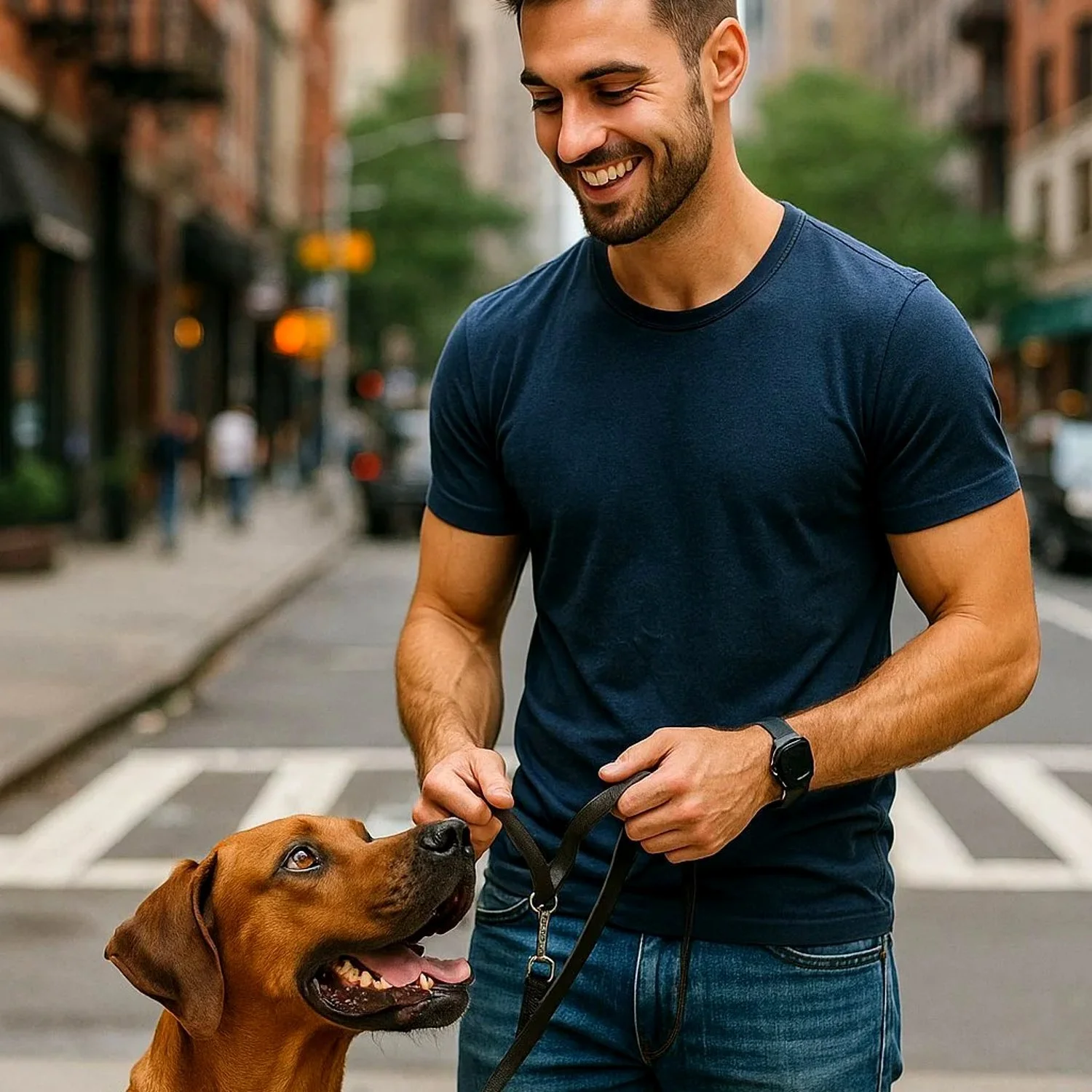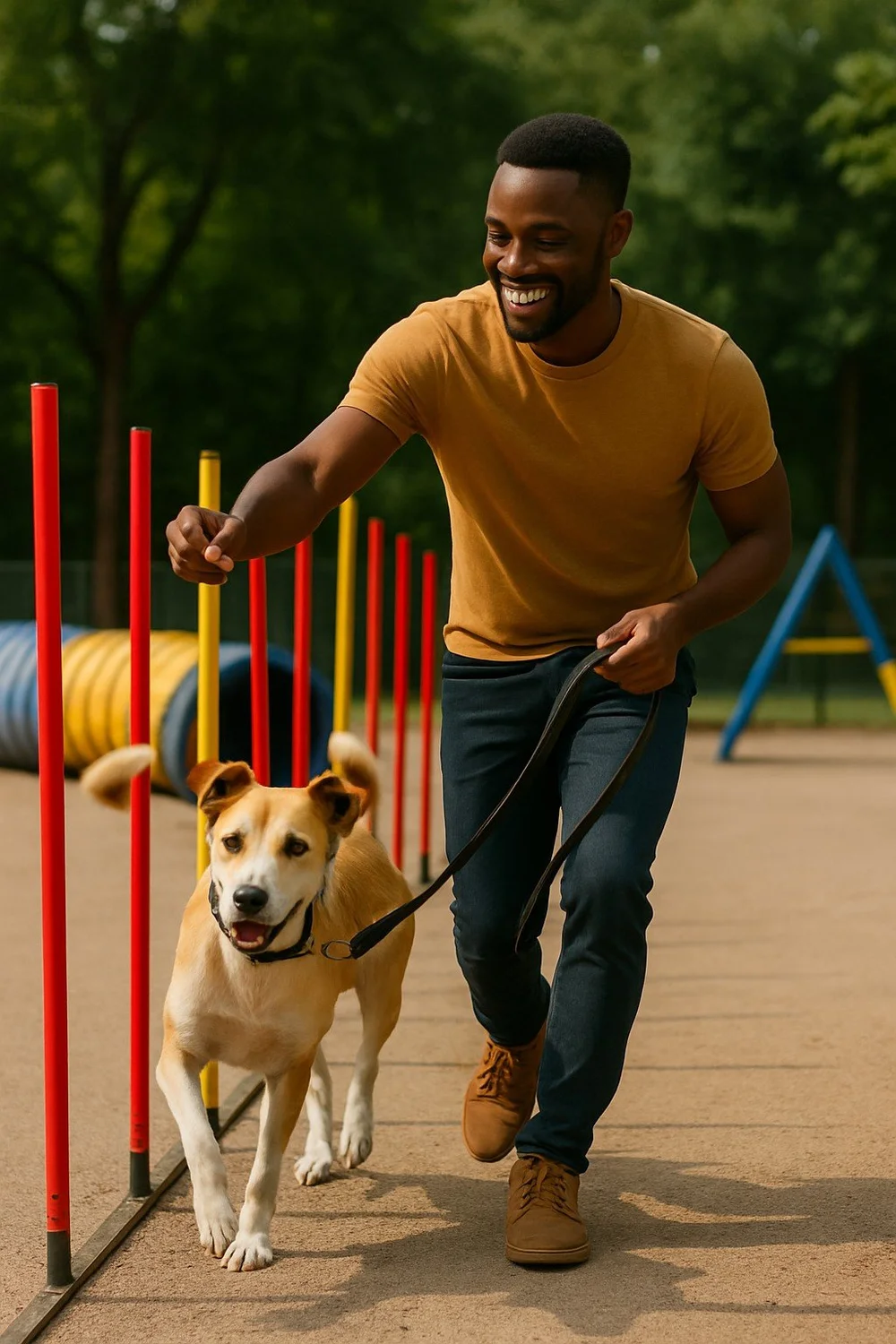Reactive Dog Training in New York City
Barking, lunging, freezing — does your dog overreact to dogs, people, or sounds?
You’re not alone — start helping your dog today.PJH Dog Training on the Upper West Side helps NYC dog owners calm reactivity using science-based, positive methods that rebuild confidence on both ends of the leash.
✔ Fear & Leash Reactivity
✔ City Triggers & Noise Sensitivity
✔ Confidence Building & Calm Walks

How to Know If a Trainer Is the Right Match for Your Dog
Reactive dog training isn’t about finding “the best trainer” — it’s about finding the right match for your dog’s triggers, temperament, and daily life. Here’s what actually matters when choosing someone to help your reactive dog.
- Trigger Profile: dogs, people, noise, movement.
- Owner Goals: calm walks, focus, group readiness.
- Budget & Schedule: consistency drives progress.

Evidence of Real Outcomes
Clients across the UWS and NYC see measurable progress:
“Within eight weeks, lunging dropped by 75% or so.”
— J.S.
“Finally a method that worked — science-based, positive training with LASTING results.”
— M.L.
Transformations You Can See
Every photo captures a moment of progress — calm focus, trust restored, and teamwork in action.

200+ NYC Dogs Helped
From over-aroused to relaxed, calm, and connected

50–70% Typical Improvement in 8–10 Weeks
Higher in ideal conditions.

100% Reward-Based Training
Force-free, neuroscience-guided behavior change

Capacity & Availability
Reactive-dog training is intensive — we limit quarterly enrollment so each dog receives full attention.
- 60–90 minute in-home evaluation
- Weekly private sessions
- Optional group exposure work

Our Method & Owner Coaching
We use force-free, reward-based methods grounded in behavioural neuroscience.
- Trigger analysis + custom plan
- Home environment adjustments
- Handler skills + communication
- Weekly homework + accountability
Sustainable change comes from confident, skilled owners — we guide you every step.
Building Reactive Resilience on the Upper West Side
Our unique dog reactivity program on the Upper West Side is designed to bring calm to you and your dog's lives. Using proven scientific techniques together with close attention to your dog's needs, we work to reduce reactivity and enhance resilience.Here’s How to Get Started Training Your Reactive Dog
Step 1: In-Person Consultation
We begin with a thorough, in-person consultation to understand your dog’s behaviors, environment, and specific triggers. From there, we create a customized reactivity training plan tailored to your dog’s unique needs.
Step 2: Private In-Home Training
Where ever you are in NYC, we offer in-home training or Reactive Resilience Therapy™️ throughout NYC to work on counter conditioning, desensitization, redirection, and reinforcing calm behavior where it matters most—real life. Personalized coaching ensures your dog progresses with clarity and confidence.
Step 3: Group Workshops (Optional)
When your dog is ready, we offer controlled group workshops and agility classes designed for reactive dogs. These structured sessions build social resilience while improving emotional regulation through therapeutic movement.
Bonus: Outdoor Agility Classes
Ready to build confidence and burn energy? Our outdoor agility classes on the Upper West Side, held at Central Park and Riverside Park, are a great outlet for reactive dogs. They’ll learn to focus, move with purpose, and have fun in a safe, supportive environment.
Training builds more than skills—it creates a partnership rooted in trust, choice, and love.
A calm dog is a confident dog—every step of training brings more joy and trust into your bond.
Why Choose PJH Dog Training for Reactive Dogs?
Expertise You Can Count On
Dr. Pepe J. Hernandez, Ph.D. in neuroscience and CPDT-KA certified dog trainer, brings evidence-based insight to every training session. Our approach is grounded in both behavior science and real-world results. Learn more →
Custom Reactivity Plans
We don’t do one-size-fits-all. Every reactive dog gets a tailored behavior plan based on their specific triggers, environment, and temperament — because progress is personal.
Positive, Force-Free Methods
Our training is humane and modern — no fear, no pain. We use desensitization, counter-conditioning, and reward-based systems to build trust and long-term emotional resilience.
Local & Convenient Options
We offer private sessions and group workshops across the Upper West Side and NYC — so you can access training in your neighborhood without stress or long commutes.
Ready to get started? Give us a call at 347-754-1988
3 Ways Your PJH Dog Trainer Will Help Your Dog Stay Calm in Any Situation
1. Reconditioning Motivation
Your trainer will reframe your dog’s relationship to food and work. Even in stressful, distracting situations, your dog will learn to accept treats and stay motivated.
2. Counterconditioning & Desensitization
Through carefully structured exposure, your trainer will change your dog’s emotional response to triggers—from fear or frustration to calm and positive associations.
3. Rebuilding the Human-Dog Relationship
Your trainer will strengthen your bond by showing your dog that you are in control of situations, offering safe options and choices. This reassurance allows your dog to relax and trust your leadership.
Reactive Dog Training – Frequently Asked Questions
Reactivity refers to exaggerated emotional responses to stimuli — such as barking, lunging, or growling at dogs, people, bikes, or other triggers. It’s often rooted in fear, frustration, or over-arousal, not aggression.
Reactivity can almost always be improved — and in many cases, significantly. While some dogs may always need a little management, the goal is helping them stay calm and make better choices under stress.
Not at all. Dogs can learn at any age. In fact, many reactive dogs make faster progress as adults when we understand their triggers and motivations better than we did when they were puppies.
For reactive dogs, random or high-pressure socialization usually makes things worse. Structured, controlled exposure is safer and far more effective. We’ll help you learn when and how to introduce your dog to stimuli safely.
Some dogs make noticeable progress in a few weeks, while others take months. It depends on your dog’s triggers, past experiences, and consistency of training. Our goal is steady, sustainable change — not quick fixes that fall apart.
We use reward-based, force-free methods rooted in behavioral science. Techniques include counter-conditioning, desensitization, marker training, and controlled setups to build confidence without overwhelm.
Usually no — unless the group is specifically designed for reactivity. Our training starts with private sessions to build skills and confidence first. Some dogs may graduate to reactive-dog-specific classes later.
They may suppress symptoms short-term, but they often increase fear and tension — the root of reactivity. We don’t use pain-based tools. Long-term behavior change requires trust, not force.
A well-fitted front-clip harness, longline leash, and high-value treats go a long way. We may also recommend visual barriers, interactive toys, or calming routines depending on your dog’s needs.
Private reactive dog sessions typically range from $100 to $200 depending on trainer expertise and location. We offer packages with savings and always begin with a one-on-one consultation to assess your dog’s needs.





